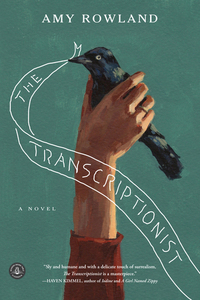You need to sign in or sign up before continuing.
Take a photo of a barcode or cover
This short novel is exquisite. The language is delicious; there are so many sentences to savor. The story is a very interior one, focused on the memories, memorized quotes and language that flows over and through the main character, Lena. Her job is to transcribe stories from reporters who call in their articles from all around the globe. Over time, she begins to identify strongly with these stories that weave themselves into her waking and sleeping life. There are other characters that she is fond of, that she detests, that she comes to know, yet, in the end, this is the story of her internal monologue.
Themes of the purity and promise of language, the allure and threat of death, the role of journalism as keepers of truth and community are layered as Lena moves through her days in search of answers to the story that shows the intersection of her real life with her work as transcriptionist.
Themes of the purity and promise of language, the allure and threat of death, the role of journalism as keepers of truth and community are layered as Lena moves through her days in search of answers to the story that shows the intersection of her real life with her work as transcriptionist.
I liked this. It was a short, weird, and introspective book. You have, essentially, a woman alone in the world who is trying to cling to a job that makes her seem transparent. She doesn't matter, and she's becoming obsolete due to technology advancements.
It wasn't a life changing book. It also didn't have a lot happen in it, which is weird.
People who like the Sundance film festival would probably love this. This strikes me as a movie you would find there.
It wasn't a life changing book. It also didn't have a lot happen in it, which is weird.
People who like the Sundance film festival would probably love this. This strikes me as a movie you would find there.
I hate giving books low scores but i finished the book feeling disappointed. Such an interesting premise that just fell flat. (at least I found out the meaning behind the cover.) #fooledbyacoolcover
While the intent of the story is to inspire readers to search for their own meaning in life, The Transcriptionist ultimately depresses readers. Lena’s antics become increasingly desperate as she recognizes the growing futility of her position and struggles to connect with the doomed woman. However, therein lies the point Ms. Rowland attempts to portray. For, just as Lena begins to lose herself in the news stories she transcribes – mostly sensational, almost always describing terrible events throughout the world – so does each person who gets caught up in the headlines. As the press glories in reporting each and every negative news story in the world, it is easy to lose oneself to the horrors happening around the globe and thereby lose perspective and a sense of place in one’s smaller sphere of influence.
This sense of loss does not limit itself to the newspapers though. As Lena discovers through the increased use of technology by her colleagues, having the world available at one’s fingertips through smartphones, email, tablets, the Internet, and other portable devices encourages the lack of interpersonal communication. It is this failing in her own life that starts her on her path to uncover the truth behind the missing woman.
Lena is a complicated character. On the one hand, she prides herself on her exactitude at her job and her solitude outside of it. However, she also struggles with it, knowing it is not the healthiest way of life for a young woman and knowing she had much higher expectations of her life in New York. She removes herself from society and from the reader, so much so that a reader has difficulties getting to know and understand her. She is simultaneously a sympathetic character but also one that is too remote to be an empathetic one.
The writing within The Transcriptionist is beautiful. Lyrical without being overly poetic and symbolic, it ebbs and flows to mirror Lena’s moods. It draws a reader into the chaos of Lena’s mind, the bustle of New York streets, and the hustle of a newspaper always trying to meet printing deadlines. It showcases the beauty behind the city’s squalor and the peace among the commotion. Ms. Rowland’s prose is a true highlight of the novel.
The Transcriptionist is a fast-moving story about adaptation and the need for human interaction in a world increasingly reliant on the remoteness of technology. Lena’s forays outside of her isolated world only serve to highlight that need as she discovers more about herself and her aspirations than she ever thought she would know. It is a thinking person’s novel, as it provides plenty of fodder for reflection. While not the flashiest novel to hit bookstores, there is an earnestness and simplicity to the story that enhances Lena’s story and a reader’s overall enjoyment.
This sense of loss does not limit itself to the newspapers though. As Lena discovers through the increased use of technology by her colleagues, having the world available at one’s fingertips through smartphones, email, tablets, the Internet, and other portable devices encourages the lack of interpersonal communication. It is this failing in her own life that starts her on her path to uncover the truth behind the missing woman.
Lena is a complicated character. On the one hand, she prides herself on her exactitude at her job and her solitude outside of it. However, she also struggles with it, knowing it is not the healthiest way of life for a young woman and knowing she had much higher expectations of her life in New York. She removes herself from society and from the reader, so much so that a reader has difficulties getting to know and understand her. She is simultaneously a sympathetic character but also one that is too remote to be an empathetic one.
The writing within The Transcriptionist is beautiful. Lyrical without being overly poetic and symbolic, it ebbs and flows to mirror Lena’s moods. It draws a reader into the chaos of Lena’s mind, the bustle of New York streets, and the hustle of a newspaper always trying to meet printing deadlines. It showcases the beauty behind the city’s squalor and the peace among the commotion. Ms. Rowland’s prose is a true highlight of the novel.
The Transcriptionist is a fast-moving story about adaptation and the need for human interaction in a world increasingly reliant on the remoteness of technology. Lena’s forays outside of her isolated world only serve to highlight that need as she discovers more about herself and her aspirations than she ever thought she would know. It is a thinking person’s novel, as it provides plenty of fodder for reflection. While not the flashiest novel to hit bookstores, there is an earnestness and simplicity to the story that enhances Lena’s story and a reader’s overall enjoyment.
I read this in too many disjointed sessions (before bed, that is, while falling asleep) and I know this caused me to see only traces of the threads that tie things together (imprisonment, death, blindness, self). Perhaps I shall read it again sometime in larger chunks.
Lena, the last transcriptionist at "The Record" (thinly veiled pseudonym of the NY Times) becomes obsessed with a blind woman she met by chance on a bus. Though the reason for the obsession are never fully clear, it's apparent she sees some of herself in this woman - Lena transcribes journalist's stories and the blind woman is a court reporter - transcribing courtroom proceedings. This woman's suicide is what starts Lena's downward spiral. Overall a meditation on what we observe, commit to memory, and discard.
Lena is the transcriptionist in a newsroom. She sits, isolated, in a room with headphones on, listening to other people's stories. After a story comes across her desk of a woman who was eaten by lions in the zoo, Lena begins to seek out the woman's history. She realizes that she had an encounter with that very same woman on the bus just a few days prior. A story about language, about technology, about our increasingly isolating culture, The Transcriptionist explores it all. While the story was interesting and captured me, I spent the entire time waiting for something more. I can't explain what exactly that would have been, but I did feel a lack of... something.
What can I say??? I thought the themes that were explored in this book were interesting, well realized, and thought provoking...but I didn’t connect to the characters and the whole book had a strange dreamlike feel to it. Part of this was because of where are main character was mentally, but it also was slightly offsetting as a reader. On one hand I thought it was a fabulous book, but on the other hand did it really make me feel anything? I’m writing this review having read the book a week or so ago. I still can’t decide how to rate it. I feel that it brought up some very interesting questions: Should information be hidden to protect others? Should media be more invested in people than their stories? What is the affect on someone who is constantly taking in information, but feels unable to speak back?
This book made me think deeper, but I also felt like the characters were a means to an end.
This book made me think deeper, but I also felt like the characters were a means to an end.
Like a student's literature text, complete with discussion questions at the back of the book. It sure seemed intriguing at first glance and in the beginning, but the middle part dragged for a long time before it finally picked up again in the end. Not really as haunting or provocative as the blurbs say it is.





